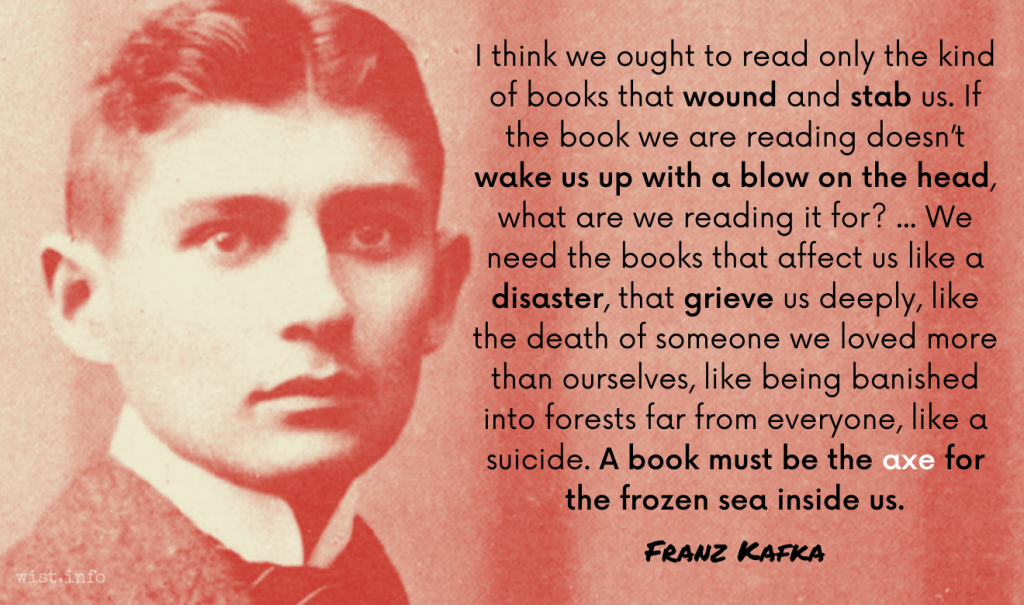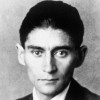I think we ought to read only the kind of books that wound and stab us. If the book we are reading doesn’t wake us up with a blow on the head, what are we reading it for? So that it will make us happy, as you write? Good Lord, we would be happy precisely if we had no books, and the kind of books that make us happy are the kind we could write ourselves if we had to. But we need the books that affect us like a disaster, that grieve us deeply, like the death of someone we loved more than ourselves, like being banished into forests far from everyone, like a suicide. A book must be the axe for the frozen sea inside us. That is my belief.
[Ich glaube, man sollte überhaupt nur solche Bücher lesen, die einen beißen und stechen. Wenn das Buch, das wir lesen, uns nicht mit einem Faustschlag auf den Schädel weckt, wozu lesen wir dann das Buch? Damit es uns glücklich macht, wie Du schreibst? Mein Gott, glücklich wären wir eben auch, wenn wir keine Bücher hätten, und solche Bücher, die uns glücklich machen, könnten wir zur Not selber schreiben. Wir brauchen aber die Bücher, die auf uns wirken wie ein Unglück, das uns sehr schmerzt, wie der Tod eines, den wir lieber hatten als uns, wie wenn wir in Wälder verstoßen würden, von allen Menschen weg, wie ein Selbstmord, ein Buch muß die Axt sein für das gefrorene Meer in uns. Das glaube ich.]
Franz Kafka (1883-1924) Czech-Austrian Jewish writer
Letter to Oskar Pollak (1904-01-27) [tr. Winston (1977)]
(Source)
This passage (in translation) is frequently only partially quote, particularly the final "ice axe" line, making parallel translations difficult. I have tried to give as full quotations as I could find.
(Source (German)). Alternate translations:
Altogether, I think we ought to read only books that bite and sting us. If the book we are reading doesn't shake us awake like a blow to the skull, why botehr reading it in the first place? So that it can make us happy, as you put it? Good God, we'd be just as happy if we had no books at all; books that make us happy we could, in a pinch, also write ourselves. What we need are books that hit us like a most painful misfortune, like the death of someone we loved more than we love ourselves, that make us feel as though we had been banished to the woods, far from any human presence, like a suicide. A book must be the ax for the frozen sea within us. That is what I believe.
[tr. Pawel (1984)]
If the book we are reading does not wake us, as with a fist hammering on our skulls, then why do we read it? Good God, we also would be happy if we had no books and such books that make us happy we could, if need be, write ourselves. What we must have are those books that come on us like ill fortune, like the death of one we love better than ourselves, like suicide. A book must be an ice axe to break the sea frozen inside us.
[E.g. (1987)]
The books we need are the kind that act upon us like a misfortune, that make us suffer like the death of someone we love more than ourselves, that make us feel as though we were no the verge of suicide, or losrt in a forest remote from all human habitation -- a book should serve as the ax for the frozen sea within us.
[tr. Rahv (1952)]
A book should be an ice-axe to break the frozen sea within us.
[E.g.]
A book must be an ice-axe to break the seas frozen inside our soul.
[E.g.]




Pingback: My Imaginary Friends: Episode 4 | L. Penelope :: Award-Winning Fantasy Author
Time for another “State of the WIST” post. I last ran this report in September 2022; time flies when you’re having fun. I’ve been pretty…